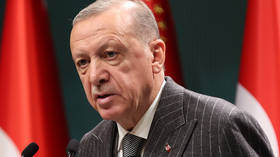Nord Stream saboteurs plunged EU into ‘energy poverty’ – Moscow

The perpetrators of the attacks on the Nord Stream natural gas pipelines have destroyed the European Union’s hope for a secure and sustainable energy supply, Deputy Prime Minister Aleksander Novak has explained on the sidelines of the Russian Energy Week forum.
“Those who had plotted and perpetrated this terrorist act have basically plunged Europe into an energy poverty, so to speak,” Novak said on Friday, adding that the sabotage of the pipelines has all but “nullified the energy security” the EU has long sought to achieve.
The former energy minister previously said Russia is still able to supply natural gas to the European Union through a string of Nord Stream 2 that remains intact. According to President Vladimir Putin, the ball is now in the EU’s court on whether it will receive those imports.
Putin also suggested establishing a new “gas hub” in Türkiye to move the transit volumes to the Black Sea region. Turkish President Recep Tayyip Erdogan backed the idea during the leaders' meeting earlier this week.
The Nord Stream 1 and 2 gas pipelines – designed to carry Russian natural gas directly to Germany, bypassing transit states, including Ukraine and Poland – abruptly lost pressure last month, following a series of powerful underwater explosions off the Danish island of Bornholm.
Moscow has called the incident a terrorist attack and said the US, a long-time critic of Germany’s reliance on Russian energy, stood to benefit most from the disabling of the routes, both politically and economically. Washington has denied any involvement, though Secretary of State Antony Blinken hailed the incident as a “tremendous opportunity” for Europe “to once and for all remove the dependence on Russian energy.”
In the meantime, Stockholm has rejected a plan to set up an official joint investigation team together with Germany and Denmark to look into the explosions, Reuters reported, citing a Swedish investigator. Sweden allegedly argued that its own findings are too sensitive to share even with other EU nations. All three nations also refused to grant Russia access to the probe.
Russia used to cover over 40% of the EU’s gas needs prior to the start of its military operation in Ukraine and ensuing sanctions. Supplies have dropped dramatically this year, exacerbating the energy crisis as the bloc seeks to reduce its dependence on Russian energy and punish Moscow. The US, meanwhile, has ramped up its supply of LNG to Europe in recent months, and now covers nearly half of the bloc’s LNG imports – nearly twice the share recorded in 2021.














